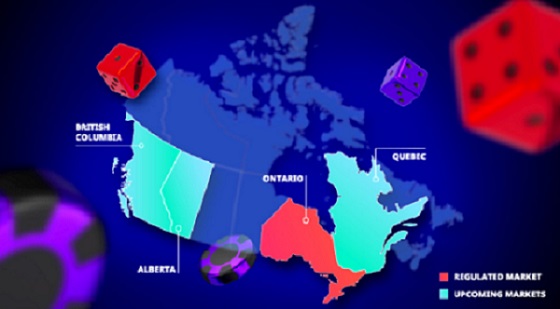Also Interesting
The Impact of Different Industries on the Canadian Economy

The Canadian economy, a beacon of resilience and growth, is underpinned by a multitude of diverse industries. These sectors don’t just contribute to the Gross Domestic Product (GDP) but also serve as pillars supporting and shaping the socio-economic landscape of the nation. An examination of four of such sectors: commercial banking, gambling, mining, and travel and tourism, reveals how they navigate through global changes, drive substantial growth, and position themselves as integral components of Canada’s economy.
The Role of Commercial Banking
Commercial Banking is a key player in Canada’s economic landscape, planning to generate a whopping $211.7 billion in revenue for 2023. Despite challenges such as low-interest rates and increasing regulations, banks have shown adaptability by diversifying their revenue streams. They have not only leveraged interest income sources, such as business loans and mortgages, but also non-interest income sources, including service fees and commissions. This adaptability strengthens the Canadian economy and positions it for sustained growth.
How the Gambling Industry Contributes
One of the industries that has grown significantly and promises further expansion is the gambling industry. The online gambling market, a pivotal segment of this industry, shows strong growth, given the strict regulatory environment in terms of jurisdictions that casino Canada is allowed to embrace. In 2021, the federal government enacted the New C-218 bill, providing a significant boost to online sports betting and other forms of legal gambling.
The Canadian gambling market is projected to reach almost 140 billion dollars by 2028. This projection highlights the potential the industry holds, not just in terms of revenue generation, but also in job creation and technological advancement. It’s interesting to note that despite the impressive online growth, physical casinos are still holding their ground, offering an experience that virtual platforms are yet to replicate fully.
Mining as The Heart of Canadian Economy
The mining sector forms a vital part of the Canadian economy, contributing 7.9% or $156 billion to the nearly two trillion-dollar GDP in 2021. With over 800 mines and more than 363,000 workers, this sector bolsters not just the economy, but also the employment landscape. Canada’s dominance in the production of potash, uranium, nickel, and diamonds globally solidifies its position in the international commodities market.
The Influence of Travel and Tourism
Travel and tourism is another industry contributing significantly to the Canadian economy. By the end of 2023, this sector is projected to reach a revenue over CAD 15.61 billion, indicating its strength despite global challenges. By 2027, it’s estimated that 82% of this sector’s revenue will be generated through online sales. This trend suggests that digital platforms are gaining dominance and are reshaping the future of the industry.
Observations and Overview of Industry Performance
Upon reflection, these four sectors – commercial banking, gambling, mining, and travel and tourism – collectively form a powerful engine driving Canada’s economy. Each industry, with its unique trends and challenges, contributes significantly to the national GDP while also shaping the country’s socio-economic landscape.
Commercial Banking continues to demonstrate resilience and adaptability, ensuring a steady flow of capital for businesses and individuals. The gambling industry, particularly the online segment, shows robust growth prospects, stimulated by regulatory changes and a shifting consumer landscape. Mining, a traditional stronghold of the Canadian economy, persists in its significant role, providing a wide array of job opportunities and underpinning the country’s position in the global commodities market.
Lastly, despite global turbulence, the travel and tourism sector illustrates significant potential for growth, particularly through the increasing prevalence of digital platforms. Each sector’s evolution provides a fascinating snapshot of a dynamic and robust Canadian economy that continues to diversify and adapt to global trends.
Also Interesting
Casino market in Canada grows in 2023 as more states consider legalization of igaming

The year 2023 marked a significant turning point for the Canadian casino industry. Ontario, the country’s most populous province, took a bold step by legalizing and regulating online gambling within its borders. This decision, met with anticipation by both the public and gambling operators, has demonstrably revitalized Ontario’s casino market and sparked discussions about similar moves across Canada.
Prior to 2023, online gambling in Canada existed in a legal grey area. While federal law prohibited the operation of online casinos by domestic entities, Canadians were free to access offshore websites that were offering various virtual slot machines, table games like blackjack or roulette and sports betting. This presented a challenge for regulators. Not only were they unable to capture tax revenue from this activity, but they also lacked control over consumer protection measures and responsible gambling initiatives.
Ontario’s decision to legalize online gambling addressed these concerns head-on. The province established a regulated online gaming market, allowing licensed operators to offer casino games, sports betting, and other forms of online gambling to residents. This move not only provided a safe and secure environment for players but also opened up a new avenue for tax generation.
The impact of Ontario’s online gambling legalization has been undeniable. Since its launch in April 2023, the market has experienced explosive growth. Gross gaming revenue (GGR) from online gambling platforms has surpassed initial projections, with analysts attributing this success to a combination of factors. Firstly, the convenience and accessibility of online gambling have attracted new customers who may not have frequented traditional brick-and-mortar casinos. Secondly, the variety and innovation offered by online platforms – with their extensive game libraries, live dealer experiences, and mobile compatibility – have proven highly appealing to existing gambling enthusiasts.
The economic benefits for Ontario have been substantial. Tax revenue generated from online gambling is already exceeding estimates, providing a significant boost to provincial coffers. These funds are being directed towards various government initiatives, from infrastructure development to social programs. This tangible financial success has not gone unnoticed by other provinces across Canada.
Several provinces, including British Columbia, Alberta, and Manitoba, are actively considering following Ontario’s lead and legalizing online gambling within their own jurisdictions. These provinces are closely monitoring Ontario’s experience, with a keen eye on the regulatory framework, tax revenue generation, and potential social impacts.
Proponents of online gambling legalization argue that the benefits extend beyond just tax revenue. A regulated market allows for stricter controls on advertising, responsible gambling measures, and player protection. Additionally, it fosters competition within the industry, potentially leading to better odds and a wider variety of games for consumers.
Opponents, however, raise concerns about potential increases in problem gambling rates and the social costs associated with it. They argue that the ease of access and anonymity offered by online platforms could exacerbate gambling addiction. Additionally, the potential for increased advertising and marketing associated with a legal online gambling market raises concerns about the normalization of gambling behavior.
Despite these concerns, the success of Ontario’s online gambling legalization has undoubtedly reignited the conversation across Canada. As other provinces weigh the potential benefits and drawbacks, it seems likely that online gambling will become a more prominent feature of the Canadian casino market in the near future. The key will be striking a balance between generating revenue, protecting consumers, and mitigating potential social harms. By learning from Ontario’s experience and implementing a robust regulatory framework, other provinces can pave the way for a safe, responsible, and prosperous online gambling market in Canada.
Also Interesting
Is the Anger Toward Fiat Currency Justified?

Back in 2012, the Cato Institute published a paper titled The Coming Fiat Money Cataclysm and the Case for Gold. The libertarian think tank is hardly unique in its animosity toward the fiat currency system, nor was its 2012 paper wholly unique in its concepts and sentiments. It did, however, predict some of the issues we are trying to resolve today, notably inflation linked to the era of “cheap” money through low-interest rates.
Today, if you look at social media, particularly platforms like Reddit and Twitter/X, you’ll also find plenty of derisory posts about the fiat system. What’s more, we might argue, albeit unscientifically, that the backlash is growing. Some of this can be quantified. For example, there is some correlation between the rise of Bitcoin as hard money with a limited supply and
the criticism of the fiat currency system. However, some of it is not so easy to quantify, such as the animosity toward fiat currency being linked to wider dissatisfaction with the state.
But is any of it justifiable? The problem with answering that question is that there are both economic and sociological answers. The former is easier to frame, whereas the latter is not. Let’s start, though, by analyzing what we mean by fiat currency, which will help us understand its critics.
Fiat currency is effectively all money
Fiat currency is essentially money not backed by a physical commodity (gold or silver, for instance). It is, therefore, nearly all the money in existence in the world today. When you look at the trillions of dollars being traded in forex markets, it is fiat currency that’s being traded. The Canadian dollar used to be partially backed by gold, and some of its value is derived
from oil prices, but despite some arguments to the contrary, it remains a fiat currency.

So, why, then, should we criticize money? Well, it’s due to the fact that having no physical backing, such as a lump of gold or a barrel of oil, central banks and governments can print that money out of thin air. The charge against it is that printing new money creates more of it (naturally), and that eventually devalues it. You’ll often see anti-fiat accounts on Twitter/X
posting charts of how their currency’s purchasing power has declined or will decline over time. This is the economic argument against fiat currencies.
This chart shows how many years it would take for each fiat currency to lose 50% of its buying power if today's inflation rates remained constant.
The red line marks the average number of years worked before retirement.
There will be no retiring if one chooses to save in fiat. pic.twitter.com/P5CjXg5v3e
— Sam Callahan (@samcallah) April 2, 2024
However, the argument loses merit when certain factors are pointed out. Yes, the Canadian dollars in your pocket lose purchasing power over time, and that’s why you can’t buy a house for the same price as your grandparents. Yet, you also will earn a lot more than your grandparents. If something used to cost a dollar and you earned ten per hour later costs five
dollars, yet you earn fifty per hour, there isn’t really a problem. Of course, that’s just the theory, and it does not always work that way in practice.
Wages keeping up with inflation
In Canada, for example, disposable personal income has tripled since 2001. It also increased in the last quarter of 2023 (the latest period for measurement). Have wages kept up with inflation? Not always; you might look at everything from the cost of a cup of coffee to your mortgage payments to consider that it hasn’t. But the problem is not fiat currency in and of itself. It is the balance between price rises and the amount of money you earn. From the period 2019-2022, average hourly wages grew 12.5% in Canada; CPI rose 10.1% in that time. There were accelerated periods of inflation, particularly in the aftermath of the pandemic, but on balance, wages kept up with inflation.
Now, none of this is meant to say that the fiat system is perfect, nor does it suggest that the government and central banks get it right on balancing the system. But broadly speaking, the antagonism toward fiat currency tends to be more sociological than economic. In short, people are angry at the system, not fiat currency itself. Those pushing the demise of fiat currency are often anti-establishment, at least ostensibly. They are interested in concepts like Bitcoin not only for financial reasons but also because it is not a creation of the state.

Their concerns do go into other areas, such as central bank digital currencies (CBDCs), and it leads them to see the fiat currency system as one of control. How valid are those concerns about CBDCs? We would be foolish to dismiss them, and there should be perhaps a sense of frustration that the mainstream media is broadly ignoring the threat. At the moment, the official line from Canada is that there are no plans for a CBDC – yet. However, and this is important – the BoC is apparently researching the “need” for one in the future.
What would that “need” be? Could it be the control of citizens’ finances? There is an all-too-scary suggestion that this could be the route that governments take, where fiat currency becomes less money and more like social credit. You drink or gamble too much? Well, the government will freeze the money in your account until you prove you are spending responsibly. If we go into a situation where fiat currency becomes a system of control, then inflation is the least of our worries.
For some, there is a sense of a tipping point on the horizon. We have this situation where governments are constantly printing money – and taking on huge amounts of debt – and we have the specter of CBDCs. You can, therefore, understand the allure of Bitcoin and other decentralized forms of currency, although those systems in themselves are not perfect. The
question, though, is whether we meet these challenges before the tipping point is reached?
-

 Business3 hours ago
Business3 hours agoUN plastics plans are unscientific and unrealistic
-

 Brownstone Institute6 hours ago
Brownstone Institute6 hours agoThe Teams Are Set for World War III
-

 Education54 mins ago
Education54 mins agoSupport a young reader through the Tim Hortons Smile Cookie campaign
-

 Opinion4 hours ago
Opinion4 hours agoThe Climate-Alarmist Movement Has A Big PR Problem On Its Hands
-

 Addictions5 hours ago
Addictions5 hours agoWhy can’t we just say no?
-

 Automotive2 days ago
Automotive2 days agoVehicle monitoring software could soon use ‘kill switch’ under the guise of ‘safety’
-

 Opinion2 days ago
Opinion2 days agoClimate Murder? Media Picks Up Novel Legal Theory Suggesting Big Oil Is Homicidal
-

 Energy1 day ago
Energy1 day agoNet Zero’s days are numbered? Why Europeans are souring on the climate agenda


